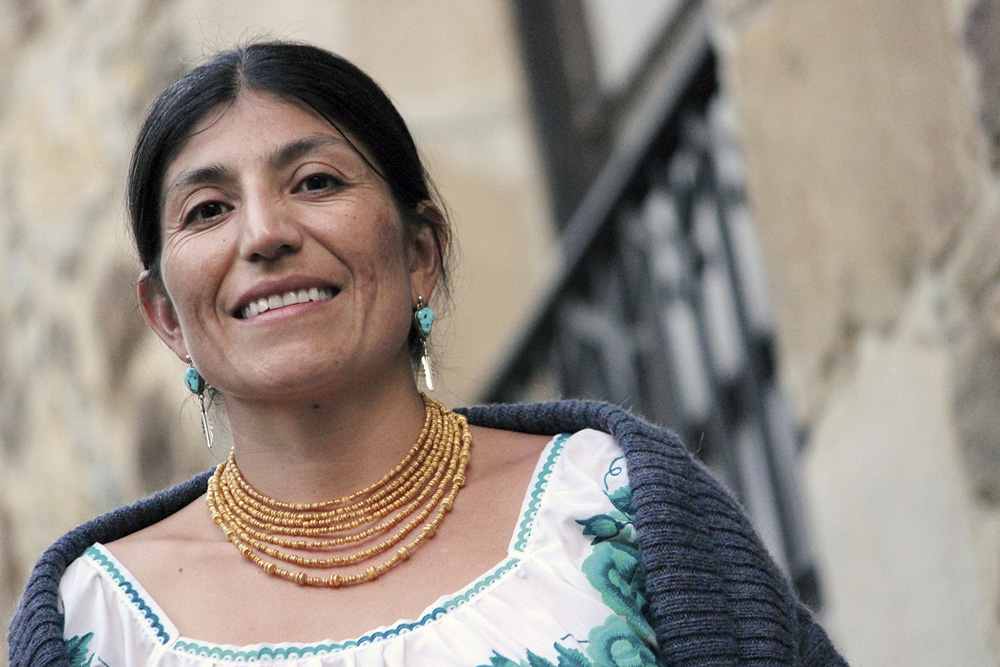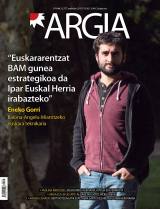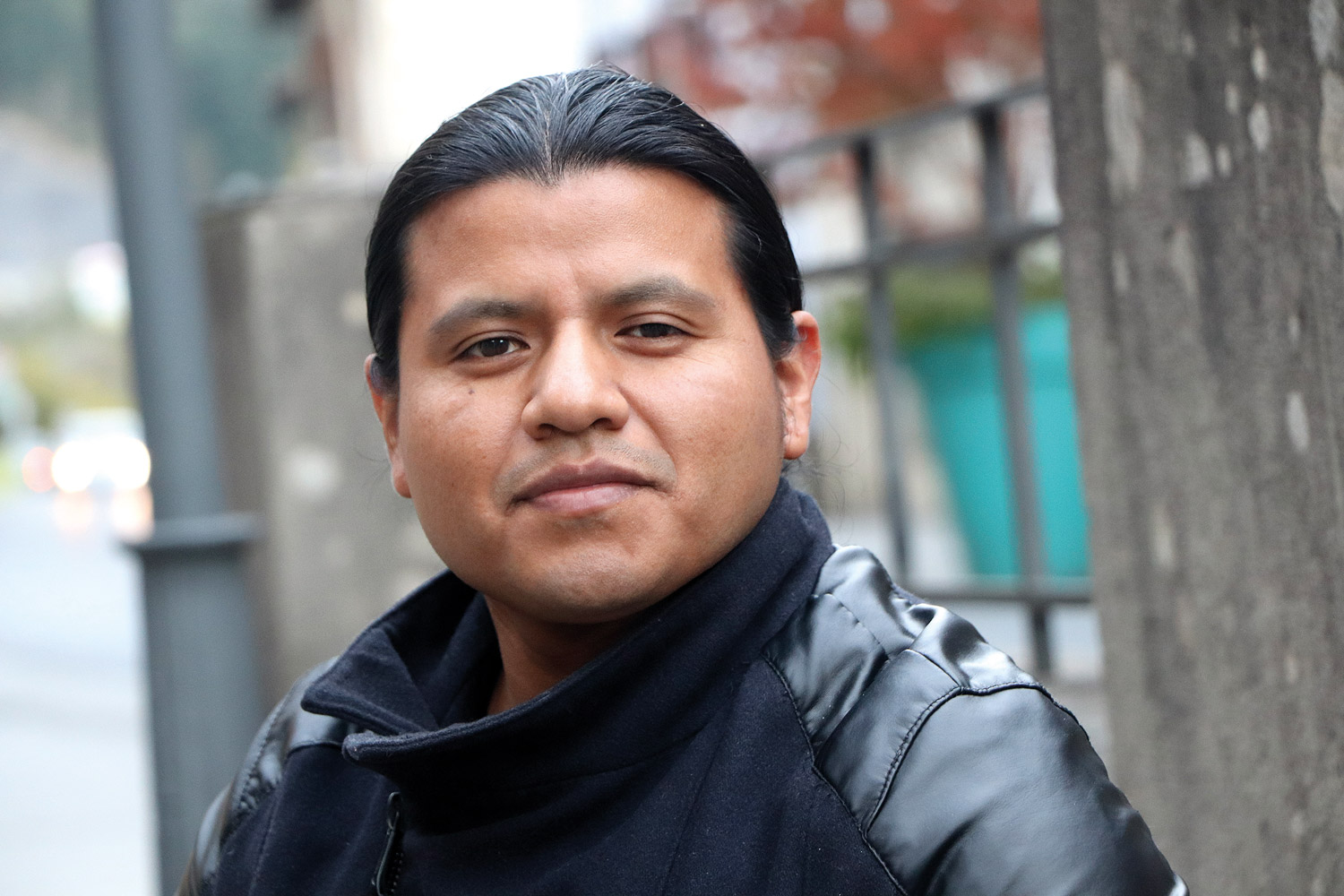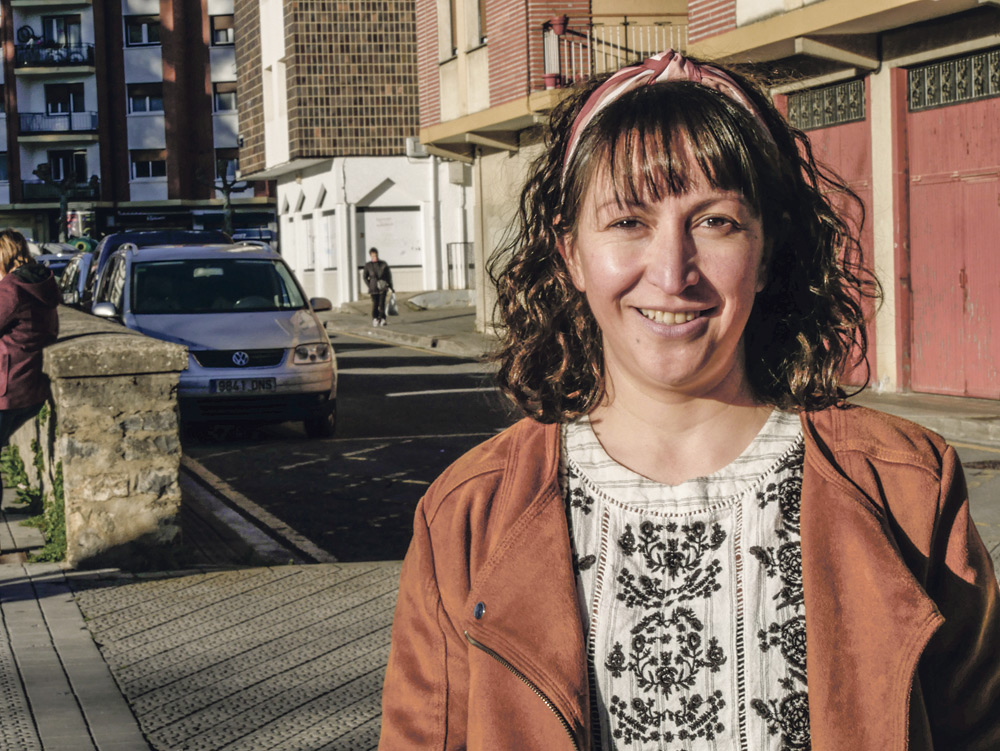"We're not going to stop being colonized until the education system turns."
- On June 17 he was appointed governor of the Imbabura of Ecuador. It is one of the seven most influential women in the region. The first indigenous governor that has existed in the country. Paolina Vercoutere Quinche, quechua.

Flandriarra lehen deitura, kitxua bigarrena. Frantsesa aita, kitxua ama. Ekuadorren hazi zen haurretatik. Kultura eta Gizarte Garapena ikasketak egin zituen Otavaloko Unibertsitatean, eta Genero eta Politika Publikoak masterra Latinoamerikako Gizarte Zientzietako Fakultatean. Garabide erakundearen hizkuntza gidaritzari buruzko ikastaldian izan zen urrian Euskal Herrian.
Quechua is the indigenous language.
I remember my grandmother talking about our language and saying Yangaximi. Yanga is “nothing.” Ximi, “tongue” or “mouth”. That is, “the language of nothingness” was Yangaximi. My mother opposed it. “Don’t say that, it’s not yangaximi, it’s rungaximi.” That is, rungaximi, “the language of man”. That is what has marked our perdition, the one we have suffered, the one that still lasts. Pride in our culture and attachment to our own existence and language are essential to begin the process of revitalization. The biggest problem we have today is to regain pride and accession. Since 2008, the rights of Ecuadorian indigenous peoples have been enshrined in the Constitution. The peoples and nations of the area have the right to receive education in their own language. The Constitution recognises what they are and what they are not, but the truth is that these languages – including Quechua – have long been devalued, discredited and, therefore, fathers and mothers do not want their sons and daughters to learn with Quechua or other indigenous languages.
That is the situation yet.
I will tell you more: when Quechua joins the administration of the state, there is a transfiguration within these speakers, who in formal spaces stop talking about Quechua. Something very rare… We have to do decolonization work – above all, decolonize it head-on and willingly – and recover our self-esteem. That's why many of our parents and grandmothers didn't tell us about the quichi, so they wouldn't receive the mistreatment they had suffered. Speaker Kitxua has a certain melody when he speaks Spanish, and that would denounce him! Not teaching the language was an exercise in survival for our parents: “It’s not helpful to you, and worse, if you find out you’re talking about Quechua, you’ll be discriminated against.” We have prepared a legal discourse, yes, a legal framework, a public policy also on interculturality and plurinationality, but the question is that we have a bilingual teaching system that does not work, that does not create bilingual students, teachers, or speakers... That is the situation, despite all the legal frameworks.
"There is a lot of talk about a multi-country state full of diversity, which includes women and this and that, but, in the end, there is no political will to reverse the situation"
It is astonishing that this political office recognises it.
There is a lot of talk about a multi-national state full of diversity, which includes women and this and that, but, in the end, there is no political will to reverse the situation. And I say this with great regret, because I am within that political system. And I think you need to be inside. As important as external activism is to influence from within, in some spaces,
however minimal they may be, ask questions and generate doubts. Before I became governor, I was the director of the Ministry of Economy and Social Inclusion, and I was responsible for children, the elderly and people with disabilities. During my time as a director, I set a criterion when it comes to choosing collaborative families: being bilingual. This gave me a great deal of resistance, even within my own party. I was taken as racist, I had to hear that my ministry was full of Indians. And now, in government, I've also had to listen to similar comments. “Here it smells Indian now.” Eleven of those. Those gossip is still there. I, for example, have a press officer, a talking quechua of origin – unlike me – that I recruited.
Excuse me, isn't it the original Quechua that speaks?
No. In my environment Spanish, French and Quechua were used. Later, also English. It was a process. I went to a free school. I was there until I was 13. From then on, I went into French school. I married young, and I married a very talking chichua, a very traditional family Quechua, and then I rebuilt myself and learned with my mother. On the other hand, our mother has always been a passionate fighter for language and culture.
Anyway, you are aware of the language.
I have the awareness of language and the sense of militancy. That's what moves me. It is not easy for me to deal with quechua, but with the basic. I understand everything, and when I have to talk, when I have no choice, I speak. Among farmers, for example, when they're not bilingual, I'm talking. And in front of people who speak very well, I'm embarrassed because mine is not a child, but has learned in the future, and the melody denounces me. My husband, a good talker, laughs at me because I don't have a good tone. In my job, when I need to hire staff, I always get bilingual. As for the press office, I appointed Quechua as a good speaker, and since then we have opened all our announcements and announcements in Quechua and Spanish. For me, it's very important to prioritize Quechua, I owe it to my mother, to my grandmother, to my community. I have to be clean, because the day I stop being clean I will have to get out of politics.

You don't have to be very demanding in that environment.
Governor, I am always wearing a certain clothing, I have a path to defend myself politically. I know what my clothing means, it's a political act, I'm in a place where there have never been women. I am used to being with the military, with the police authorities, and I have to be with them to disfigure them, precisely because until now a woman, dressed like me, has always been regarded as a servant. The maid who worked at the home of the rich. It is important for me to fight against it, and that is why I am always dressed in this way. It is complicated, however, even in my own party, as in Alianza País they do not understand me.
What do you say about interculturality? Word that is used over and over again.
Interculturality has entered the politically correct discourse. It's so used, so criticized, so worn out -- it's lost its meaning. In our country, for example, there is no interculturality. No, at least, as I understand it, because I understand it as a separation of powers. That is, interculturality begins when what the means of production, political power, resources, decision-making capacity have had for five centuries all begin to separate. Interculturality consists in talking about equality to the neighbor, acting horizontally ... That would be ideal, and that's what we don't have. Moreover, there has been so much criticism of the word – “I am tolerant” and this and that – that the word has lost its meaning and does not mean anything.
I would have thought the atmosphere was different in Otavalo.
I have been living in Otavalo for twenty years, a city of great symbolism in Ecuador. Our ancestors lived on the slopes of the hill of Imbabura, in full abandonment of the city, when it was the center of white and mestizo power. In the 1980s, because of various commercial dynamics, Queches had great economic success and bought all the properties of the city. The Quechucos became owners of the city and, as a result, we were able to enter into the struggle of political power and, for the first time in history, we had an indigenous mayor. In 1990, the National Assembly proclaimed Otavalo intercultural capital of Ecuador. I had no choice, because we live in full tension in the city – and I would say we live – because the indigenous people and the white and mestizo people are half in Otavalo. We live in indifference. Inter-ethnic problems are more than you want, racism is not ruled out. The varnish is given, but it breaks the varnish a little bit with the tip of your nails and racism will appear there.
"The non-teaching of language was an exercise of survival in the case of our parents"
Inter-ethnic problems, racism, different identities in the same territory.
I proclaim identity enthusiastically, and to the same extent I accept essentialism and traditionalism, for I am a militant in the fight for women. I have a conflict with the need to make a politically correct outward speech. I have to measure the words, not all I would like to say, but not all the politically correct words that have to be said. I am the representative of the president, and I cannot say that everything is wrong. Progress has also been made. It's true as an Ecuadorian. We have access to free education – until recently more than a dream – to the health network, to a greater awareness of our rights… Many things that have been done in the last ten years, since the state has been strengthened in a terrible way. Because until then we did not have a state, but the presence of the state, a structure that did not belong to us. You have been building a state for hundreds of years. You just started with us.
You have to swim in murgil between the politically correct and the feeling inside.
Yes, yes. And for example, that's what I mean in the writing of a master's report, in the analysis of how women survive in these spaces from a gender perspective.
He's also writing a master's degree. What do you say in that work, if you can know?
I tell you where I'm from, I explain my life experience in feminist theory. I started from feelings and completed my narrative of grandmother, mother, father and self, linking with theory. On the other hand, I have made several interviews, both among those who are Quechucos and among those who are not, to ask them about their imaginary of women. I reaffirm myself as a locked woman, I look the same as the one next to me. I owe the education I've received. I am not prepared to turn a blind eye to anyone. And that excites her, it disturbs many. And that's what I want, to dismantle the image of the indigenous woman who serves them. That's my struggle.
You attended the course of Garabide in the Basque Country. What have you seen, what are your intentions in Ecuador?
I have already seen that this is not a leader, but rather to achieve synergy and the sum of various factors within society. For example, when I saw cooperatives, I thought that this had to influence not only the economy, but also the political, social and cultural spheres. The phenomenon belongs to the whole community. In Ecuador, I'd like to create a space within the education system. I have the support of Lehendakari and the Minister of Education. I don't have the habit of saying crude. “The education system doesn’t work.” No. On the contrary, I usually say: “I would like to propose a bilingual model at Otavalo…”. And they said, “If you have enough strength, go ahead!” And that is what I would like, to build a new model and, in the meantime, to rethink the educational model, that we will not cease to be a colonized people in the midst of the revolution of the educational system, which is absolutely memorable, that destroys us as individuals, that minimizes us every time, that drags us into self-esteem… The recovery of language will come through the path of education and the recovery of our culture, our existence and our vision of the world. That's why I'm where I am.
“Herri indigenen eskubideen aitortzarik bada, baina aitortza formala da, ez besterik. Gainerakoan, inork ez du ahalegin txikiena ere egin nahi. Zuri-mestizoek –hau da, estatuaren egiturek–, ez dute saiatu nahi, eroso daude beren hizkuntzan hitz egiten, ez dute esfortzurik egiteko asmorik”
“Senarra kitxua hiztun jatorra dut, baina ez die gure seme-alabei kitxuaz hitz egiten, nahiz eta ni borroka honetan sartuta egon. Jasotako hezkuntzak kolonizatu zuen, hamaikatan esan zioten bere hizkuntzak ez zuela ezertarako balio, barneratu zuen esan ziotena, eta ez da iraultzeko gai izan. Latza da”
“Hiri giroan guztiz etena dugu kitxuaren familia transmisioa. Landa eremuan eusten diote transmisioari oraindik, baina landa eremuan kitxuaz hazi diren horiek hirira etortzen direnean ere, eten egiten da transmisioa. ‘Indioen hizkuntza da, ez du ezertarako balio’, diote. Aurreiritzi horixe da oraintxe dugun arazorik handiena”
“Unibertsitatean graduatzeko garaian, kitxuaz egin genuen tesia bi lagunen artean. Ordurako, konstituzioan jasota zegoen gure hizkuntzan jarduteko eskubidea. Gure aurrean, epaimahaia, inork ere kitxua ulertzen ez zuela. Nire kideak kitxuaz egin zuen aurkezpena, nik bat-bateko itzulpena egin nion. Epaimahaian, batak besteari galdetzen zioten: ‘Zergatik hitz egiten dute horrela?’, ‘Konstituzioan jasota dago, eskubidea dute’, ‘Legezkoa da?’, ‘Bai, bai’. Horrelaxe! Kar, kar…”















